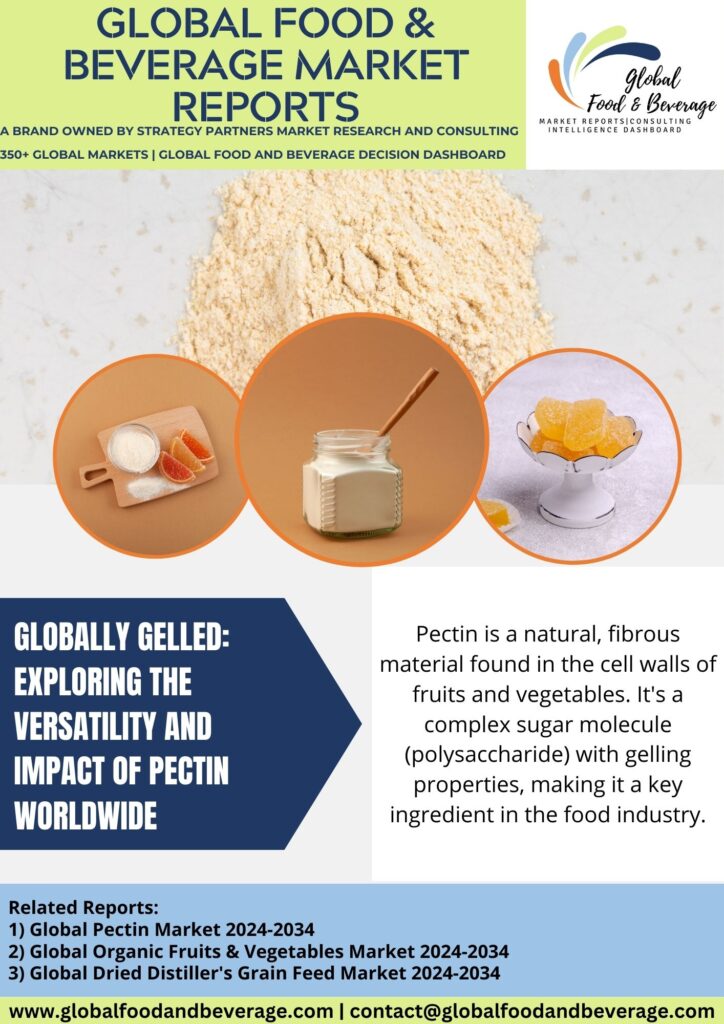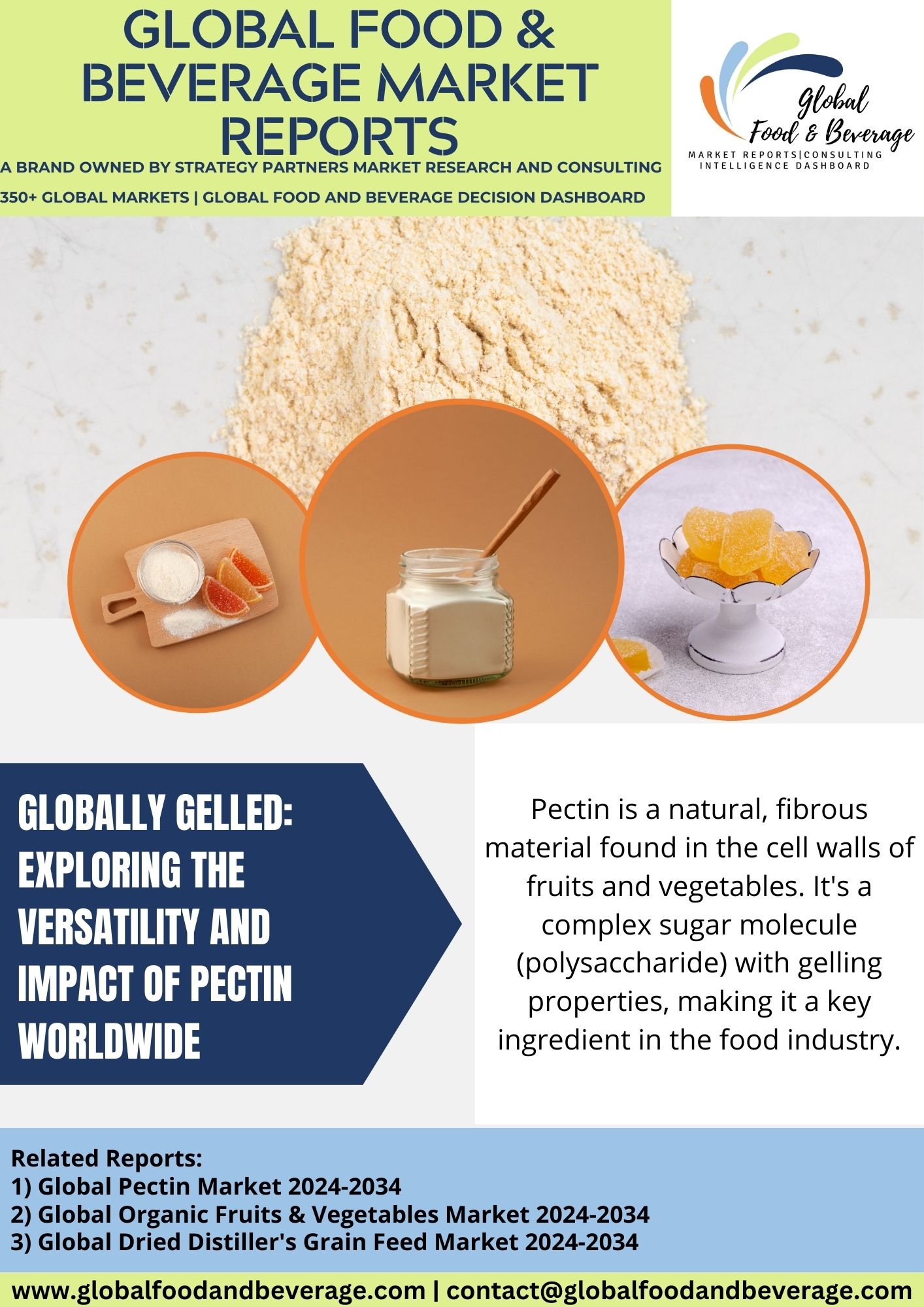Globally gelled: exploring the versatility and impact of pectin worldwide

Pectin, a versatile natural ingredient, plays a pivotal role in various industries on a global scale. Derived from fruits, especially citrus peels and apple pomace, this complex carbohydrate has gained widespread attention for its unique gelling and thickening properties.
One of the primary applications of pectin lies in the food industry. As a natural gelling agent, it is commonly used in the production of jams, jellies, and fruit preserves. Pectin’s ability to form a gel network is harnessed to create the desired texture and consistency in these products. Beyond its role in fruit spreads, pectin also finds applications in yogurts, beverages, and confectionery items.
The pharmaceutical industry recognizes the binding properties of pectin, utilizing it in the formulation of drug delivery systems. Pectin’s biocompatibility and gelling characteristics make it an ideal choice for controlled-release drug formulations. This has led to an increased demand for pharmaceutical-grade pectin globally.
In the cosmetic and personal care sector, pectin is employed for its thickening and stabilizing properties in various formulations. From skincare products to hair care items, pectin contributes to the texture and overall quality of cosmetic formulations.
The global market for pectin has witnessed significant growth in recent years, driven by the increasing demand for natural and plant-based ingredients. Consumers are increasingly inclined towards products that are perceived as healthier and more sustainable, and pectin fits well into this trend.
As a result, key players in the pectin market are expanding their production capacities to meet the growing demand. The geographical distribution of pectin production is diverse, with major players operating in regions like Europe, North America, and Asia.
ADVANCEMENT:
In recent years, the global pectin industry has experienced significant advancements, driven by technological innovation and a growing awareness of sustainable practices. Pectin, a natural polysaccharide found in fruits, has traditionally been used as a gelling agent in the food industry. Technological breakthroughs in extraction and purification methods have not only increased the efficiency of pectin production but also expanded its applications.
The development of novel extraction techniques has allowed for the isolation of pectin from a broader range of raw materials, reducing dependency on specific fruit sources. This has enhanced the sustainability of pectin production and mitigated potential supply chain issues.
Furthermore, advancements in pectin modification processes have led to the creation of tailor-made pectin varieties with specific functionalities, catering to diverse industrial needs. These modified pectins find applications in a wide range of products, including jams, jellies, confectionery, and pharmaceuticals.
The industry has also witnessed a shift towards clean-label and natural ingredients, aligning with consumer preferences for healthier and more transparent food choices. Sustainable and eco-friendly practices in pectin production, such as waste reduction and energy efficiency, have become integral aspects of the industry’s evolution.
Overall, the global advancement in pectin reflects a commitment to innovation, sustainability, and versatility, positioning this natural ingredient as a key player in the ever-evolving landscape of the food and pharmaceutical industries.
CHALLENGE:
The global pectin industry faces challenges rooted in agricultural practices, market dynamics, and sustainability considerations. One significant challenge is the dependence on specific fruit sources for pectin extraction, primarily citrus fruits and apples. Variability in fruit yields due to climate conditions and potential disruptions in supply chains can impact the availability and cost of pectin.
Market dynamics present challenges related to competition and pricing. The reliance on limited fruit sources can create fluctuations in pectin prices, affecting the economic viability of pectin production. Innovation in alternative sources and extraction methods is crucial for stabilizing prices and meeting diverse market demands.
Sustainability concerns are paramount. Traditional pectin production may generate significant by-products, necessitating environmentally responsible disposal methods. Sustainable extraction practices, waste reduction, and energy-efficient processes are integral to mitigating the environmental impact of pectin production.
Moreover, consumer preferences for clean-label and natural ingredients present formulation challenges. Adapting to the demand for pectin with minimal processing, free from artificial additives, and suitable for various dietary preferences is an ongoing challenge that requires continual research and development efforts.
In summary, challenges in sourcing, market dynamics, sustainability, and formulation collectively shape the landscape of the global pectin industry, necessitating ongoing innovation and strategic solutions to navigate these complexities.
CONCLUSION:
Forget gelatin’s wobbly past! Pectin’s bursting onto the scene, a plant-based powerhouse shaping the future of jellies, jams, and more. Eco-conscious sourcing and traceability ensure sunshine in every jar, while AI optimizes sweetness and robots keep consistency stackin’ high. Flavors bloom like never before, from spicy Sriracha to floral lavender, igniting taste buds across the globe. And remember, beyond sweets, pectin thickens sauces, stabilizes beverages, and even fuels innovations like plant-based meats. So savor this sun-soaked future, one delicious, responsible spoonful at a time. Choose wisely, choose sustainably, and let pectin sweeten your world, bite by global bite.
